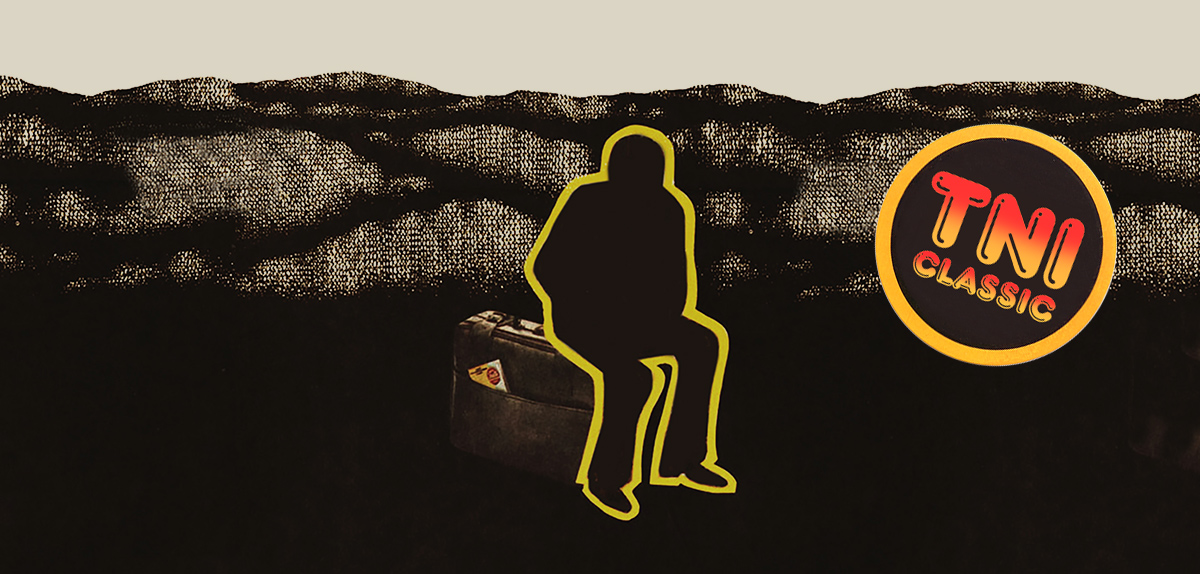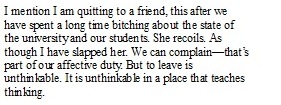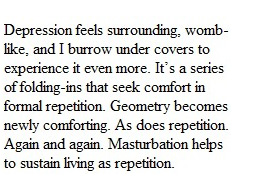
A few years into grad school, a friend’s relentlessness yields a diagnosis: bipolar disorder, an oscillation between periods of frenetic activity and profound depression. A condition rewarded by the academic calendar and publishing schedules, both based on frenetic activity and prolonged delay. At first, we think I have seasonal affective disorder, as the Midwest winter is so harsh. But my depressive symptoms shift to the summer. And get worse. My frenetic periods are praised—I take on more than I should, produce fast; my thinking feels sharp, precise. I overproduce, keep multiple drafts waiting, multiple projects at the edge of completion, hoping that their incompleteness will be enough to nudge me out of the near-catatonia of the depressive periods. Instead, I spend glorious summer days in bed, unable to move, unable to muster up the energy to turn on the fan, unable to shower, unable to think. I find solace in trash romance and children’s books. Reading sustains something, a faint flicker of something. It gets far worse than I will ever confess. And then worse than that.
A symptom: long periods of “silence” on my blog. Long absences marked by infrequent, cryptic declarations. It is not that I don’t want to write. But reading Freud has taught me that symptoms speak. And I have a career ahead of me.
I see a counselor for a while, get drugs from a psychiatrist, have my blood monitored to detect drug levels. I will have to be on drugs for the rest of my life.
I begin to wonder about the relationship between geo-history, the saturation of space with affect, and psychic health.
I want to
describe how
I come to
be here-now:
another
threshold
I start writing a linear story, winding, but linear, about psychic health and academic production, a story that tries to make sense of why I am resigning from a tenure track job from a major research university at the same time as I am completing a book manuscript for publication. Not only resigning but also changing continents, returning to a place I have not called home for a very long time. This, I realize, is a story about words and places. So let me start with the word that started it, or named its fractures.

I spent academic year 2005-2006 in Amherst, Massachusetts, as a pre-doctoral fellow through the Five Colleges Consortium. The time and space away from Illinois re-shaped my rhythms, helping to undo some of the psychic breaks I experienced in the summer of 2005. Made something else feel possible. If only for a while. It also gave me
August 5, 2007. Roots are unreliable. Once we go back far enough, identity rarely consolidates. As simple an act as stepping out of a privileged circle may compromise belonging. . . . to become political entails deracination.
I am trying to understand the “uses” of deracination. Still grappling with the affective weight deracination entails. In May 2008, I’m blogging on Tutuola, and my language has become more pressing, more, honest, perhaps: “How does this persistent undoing at the level of language (syntax, semantics, tropology) and social formations (family, community, village, ethnicity) express the affective and conceptual deracination of Afro-modernity?”
Deracination as a “persistent undoing.”
I’m wrestling with my own disorganization. My own “persistent undoing” given the occasion of the social. I am “undone” when I leave the house, walk down the street, encounter an absenting normality. I have learned not to trust myself. Perhaps it’s all the chemicals that are working and not working in my head.
I am leaving the United States, resigning from my job, and moving back to Kenya. As I have been trying to narrate this move to those who have known about it—over the past year—I have wondered about the partiality of the stories I was telling. They were not untrue; they were simply not what I really wanted to say, not what I permitted myself to say. In the most benign version, I have said that I cannot build a life here. Some might reasonably say that I could build a career here, as I have been doing, and build a life elsewhere, perhaps negotiate some kind of contract that would permit me to live here for one semester and work in Kenya for the rest of the year. Even assuming some institution was this generous with a junior faculty member, I am not sure that one can so easily separate moments of living from moments of working for extended stretches of time. I’m not sure that’s a sustainable model.
Most often when I talk about building a life, I have meant something closer to saying that I cannot imagine—or desire—a life here. And this, it strikes me, is a much harder thing to confess. After all, the academy tells me what I should desire: tenure, full professorship. Indeed, the academy provides at least a 20-year plan: undergrad, grad (10 years); tenure track through tenure (5-7 years); and if one is on a fast train to somewhere, one can achieve full professor within 5-7 years of achieving tenure. All of these come with immense benefits, and because of immense luck, I have been in a position to benefit from what these might mean. Being located in a research institution provides privilege and access: from here, the gaze is always upwards. Were I more conceited, I would say that my momentum is steadily propelling me upwards in what might be very rewarding ways. Given this scenario, why quit?
I’m not sure this is “the life” I want to imagine. I worry about any life that can so readily be “imagined.” Where is the space for fantasy, for play, for the unexpected, for the surprising?
Perhaps I’m fetishizing precarity.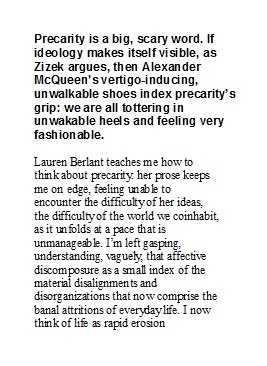
Something has happened to a sense of security (can I use that word?) or safety that I hold on to, a safety blanket, a fantasy that life was once not like this, that life can be unlike this, even as this feels much too slippery to describe, a feeling of tottering toward an undisclosed location in the securitized state.
A tenure track job at a research university is the goal, the promise, especially if one receives a degree from a research university. It demonstrates that despite all obstacles, “the system works.” We need to believe this desperately. Absolutely. Without questioning.
We are trained to hang in, hang on, hang together. This, after all, is the lesson of graduate training. “It will get better,” we assure students who struggle to learn. We are so definite. Were we more honest, we would say, “it might get better,” “perhaps,” “maybe,” or, simply, “we don’t know.” Instead, we say, “there are no guarantees, but.” And that “but,” that barely uttered, barely hearable “but” carries so much weight. Everyone wants to hear the “but.” Everyone invested in the academy is always hearing the “but.” We are a community organized around “but.” Lauren Berlant calls this “cruel optimism.”
In other versions of the story I have told, I have spoken about the structure of the university as an institution, and my particular university in particular: a half-hearted and, I think, dangerous and uncaring orientation to undergraduate education that serves only the incredibly motivated and the incredibly privileged while leaving the rest to flounder in a morass of bureaucratic details and learning failures; an almost pathological obsession with STEM as what will save the university that directs research dollars in particular ways, marginalizing the humanities in palpable ways—to give one example, of the multiple emails I regularly received from the office of research, I recall perhaps one or two that might have benefitted the humanities; a broadly anti-intellectual professionalizing atmosphere that is inimical to the long, slow life of sustained thinking and unwilling to support it, with, I think, terrible consequences for the humanities—tellingly, the most productive scholars in my department have won multiple external fellowships that keep them away from campus; an administration that is indifferent to its workers’ affects—at one meeting I attended, presented with statistics that over 50% of women and other minorities were so dissatisfied that they planned to leave, administrators said that such “threats” were a constant feature of academic life and moved on to more “pressing” issues; a fetish on productivity that is self-serving and, to my mind, disingenuous—our annual reports are presumably tied to some kind of merit pay system that has not been operational since I was hired, but is a fiction under which we traffic; colleagues who have been so beaten down by the system and have so bought into it that they do not know how to engage as scholars and are fiercely defensive. All of these combined with a profession run by a vulnerable—and becoming even more so—precariat makes it impossible for me to continue to be part of this thing as it currently exists.
I discourage students from writing long, breathless
paragraphs: rants. They proceed at a too-rapid pace,
accumulating objects and sites and scenarios and
events, refusing to breathe, indexing injury, performing
that indexing, as though time itself will stop unless
one lists at a rapid pace. Develop this idea, I say.
Develop that idea. Really show your work. Make people
understand.
But the real story, the one I have been telling and not telling over the past many years of blogging, is a Fanonian story about toxicity and exhaustion. It is a story about slavery’s long shadow and racism’s insistent pressing.
Something happens, Fanon says, when the “Negro” encounters “white civilization.” Richard Philcox’s translation blunts the edge of the word “Negro” by using “black man.” “Black man” loses the Negra/Negrè/Nigger/Niggra of black diasporic histories and slavery—it loses the edge of contempt and thingification that we must remember. Black Skin, White Masks is a book about exile/migration/immigration, even as it cannot be contained by those terms.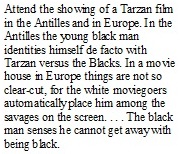 It is a book about encountering white civilization from an “outside,” no matter how fantastic that outside is. This explains, in part, why so many of us who travel as exiles/immigrants/migrants find Fanon necessary. He speaks “from” us.
It is a book about encountering white civilization from an “outside,” no matter how fantastic that outside is. This explains, in part, why so many of us who travel as exiles/immigrants/migrants find Fanon necessary. He speaks “from” us.
 For many years, Fanon has been a proxy for my affective relationship to the U.S. His rage and brilliance were easier to inhabit, draw from, circulate. Easier to use than to confess what was happening: I was being poisoned. It happened in big and small ways: the surprise on some professors' faces when I understood what they said; the insistence of many white people, even friends, on naming me as “black”; warnings from well-meaning people about “bad neighborhoods,” by which they meant predominantly black neighborhoods; demands, implicit and explicit, that I join an Afro-centric project predicated on disciplined blackness and gender normativity; unsubtle comments from academic peers that I had received “special” favors and that I was “disruptive” and should be “disciplined”; my own guilt and shame for dissociating with forms of blackness I found “distasteful” and “criminal,” by which I meant class-based; a growing, all-encompassing inability to engage with anyone without my racialized armor on; an inability to trust black men; an inability to trust myself. Encounters seemed too weighed down by history, treacle-thick, and I felt something about myself changing.
For many years, Fanon has been a proxy for my affective relationship to the U.S. His rage and brilliance were easier to inhabit, draw from, circulate. Easier to use than to confess what was happening: I was being poisoned. It happened in big and small ways: the surprise on some professors' faces when I understood what they said; the insistence of many white people, even friends, on naming me as “black”; warnings from well-meaning people about “bad neighborhoods,” by which they meant predominantly black neighborhoods; demands, implicit and explicit, that I join an Afro-centric project predicated on disciplined blackness and gender normativity; unsubtle comments from academic peers that I had received “special” favors and that I was “disruptive” and should be “disciplined”; my own guilt and shame for dissociating with forms of blackness I found “distasteful” and “criminal,” by which I meant class-based; a growing, all-encompassing inability to engage with anyone without my racialized armor on; an inability to trust black men; an inability to trust myself. Encounters seemed too weighed down by history, treacle-thick, and I felt something about myself changing.
I spent six months in Kenya in 2011, the first time I had spent such an extended time in Nairobi since I first left in 1995. 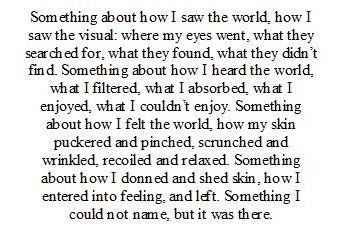 After a few months, something seemed to loosen. I could encounter the world. I could risk leaving the house without my armor. I could confront the difficulties of race and class without experiencing a sense of futility. I could feel that something about me was being judged on different grounds: not “despite” or “in spite of” or “luckily” or any of the phrases and terms that I felt so often tokenized me in the States. It’s not that Nairobi was easy: if race marked my entry into the U.S., ethnicity marked my re-entry into Kenya in ways that I found, still find, distasteful and difficult, impossible to navigate, causes for shame and guilt. But this, I thought, was something I could try to do something about, without being faced with a too-common U.S. reaction: I was the wrong kind of black, an immigrant body, and so had no real grounds from which to speak. And should be grateful.
After a few months, something seemed to loosen. I could encounter the world. I could risk leaving the house without my armor. I could confront the difficulties of race and class without experiencing a sense of futility. I could feel that something about me was being judged on different grounds: not “despite” or “in spite of” or “luckily” or any of the phrases and terms that I felt so often tokenized me in the States. It’s not that Nairobi was easy: if race marked my entry into the U.S., ethnicity marked my re-entry into Kenya in ways that I found, still find, distasteful and difficult, impossible to navigate, causes for shame and guilt. But this, I thought, was something I could try to do something about, without being faced with a too-common U.S. reaction: I was the wrong kind of black, an immigrant body, and so had no real grounds from which to speak. And should be grateful.
When I returned to the U.S. from Kenya in December 2011, I could feel the poison re-entering my system: my skin changed again, as the hard Baltimore water scrubbed off the softer Nairobi water, and, with it, whatever healing Nairobi had effected. I returned to James MacArthur and Christopher Dorner, to the disposability and killability of black men; I returned to “jokes” about nine-year-old girls; to a panel discussion on Django Unchained hosted by film scholars at my university that did not, in the initial panel composition, include any single black scholar; I returned to a post-racial U.S., which meant that racist jokes could circulate with impunity; I returned to a world that Ida B. Wells and W.E.B. Du Bois would have found too familiar, and mourned.
I returned to a world that Caribbean-born, Liberian intellectual Edward Wilmot Blyden described as uninhabitable. From the mid- to the late-nineteenth-century, Blyden had urged Afro-diasporic populations from the U.S. and the Caribbean to move to Africa, convinced that they could not thrive in western modernity. In helping to found a university in Liberia, he argued that any work produced during and after the Renaissance, the so-called age of exploration, was too racially toxic for African students. And so he attempted to create structures of knowledge devoid of toxicity. Reading Blyden shifted something in me and for me. I began to ask whether it was possible to live outside of toxicity. Whether, in fact, what felt like a utopian possibility rendered impossible by globalization could be any kind of model.
At a required end-of-year meeting with my then department chair, I confessed that I was exhausted. I was tired of the banal and uncomprehending racism of white students who spoke of blacks as “they” and “them” and complained about “their broken English” and “bad dialect”; I was tired of a system that served black students badly, promising an education that it failed to deliver, condemning them to repeat classes, to drop out, to believe they were stupid; I was tired of colleagues who marveled when I produced an intelligible sentence; I was tired of attending conference panels where blackness was dismissed as “simple,” “reactive,” “irrelevant,” “done”; I was tired of being invited to be “post-black” as the token African, so not “tainted” by the afterlife of slavery; I was tired of performing a psychic labor that left me too exhausted to do anything except go home, crawl into bed, try to recover, and prepare for the next series of assaults.
Blyden, of course, got it wrong. Fanon got it right.
Leaving the U.S. will not remove me from toxicity and exhaustion. At best, it will allow limited detoxification, perhaps provide me with some energy. Perhaps it will provide a space within which scabbing can begin, and, eventually, scars that will remain tender for way too long.
